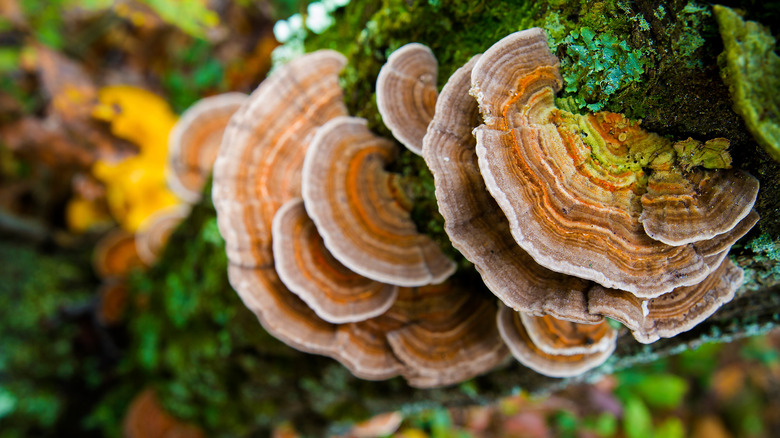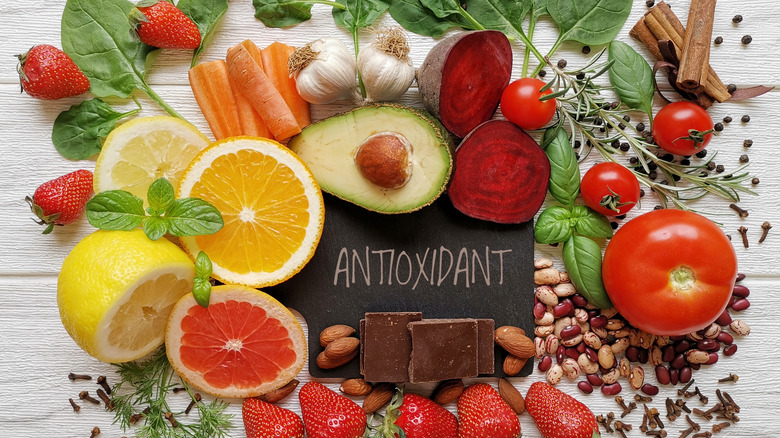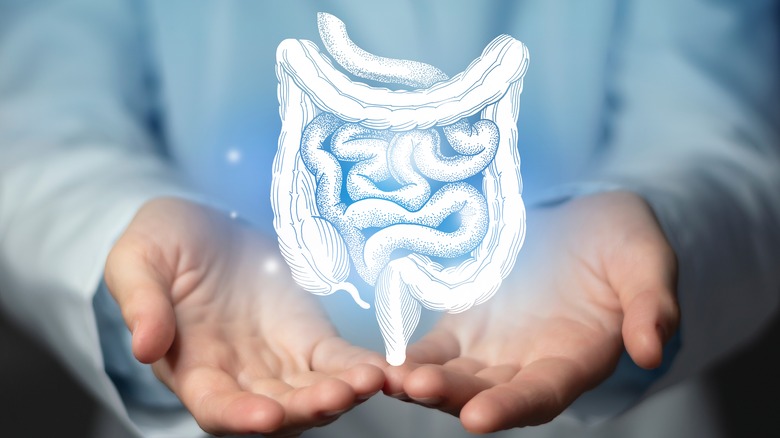How Turkey Tail Mushroom May Help Boost Your Immune System
Turkey tail mushrooms, also known as Trametes versicolor, have been a mainstay in traditional medicine for centuries and are found on tree trunks and fallen trees in woodland areas in North America and worldwide (via Medical News Today). These mushrooms are disc-shaped and multicolored, resembling a turkey's tail, hence the inspiration for its name.
Mushrooms are the fleshy, spore-bearing fruiting body of a fungus, per News Medical. They belong to the kingdom Fungi and are a type of eukaryotic organism. Although fungi are sometimes confused with plants, they differ from the plant kingdom in several ways. In particular, they lack chloroplasts, which is why they can't photosynthesize, says the University of California, Davis. Furthermore, fungi can be both multicellular and unicellular, and some of them count as microorganisms which means they can't be seen by the human eye unless under a microscope, per the university.
According to a 2012 study published in Global Advances in Health and Medicine, turkey tail mushrooms are known as bracket fungi because they form in thin structures and concentric circles. Due to their powerful compounds, they might help fight certain cancers, in addition to boosting the immune system, says Healthline. Here are a few reasons why turkey tail mushrooms may help boost your immune system.
They're packed with immune-boosting compounds
Eating mushrooms, in general, has a number of health benefits. However, mushrooms rich in polysaccharides, especially β glucans, are more likely to stimulate your immune system than other mushrooms, per this 2017 review published in the International Journal of Molecular Sciences. Interestingly, immune modulation is the primary mechanism of turkey tail mushrooms, according to this 2012 review published in the journal Global Advances in Health and Medicine. Although various medicinal mushrooms exist, turkey tail mushrooms can be touted for their immune-boosting benefits since they contain polysaccharides, as revealed by Healthline.
In addition to polysaccharide krestin (PSK), another compound known as polysaccharide peptide (PSP) is found in turkey tail mushrooms. This compound might help slow cancer growth and boost the immune system. According to Healthline, PSK and PSP activate and inhibit specific types of immune cells and suppress inflammation, which helps to promote your immune system's natural response. PSP increases a specific type of white blood cells called monocytes which fight infections and boost immunity. On the other hand, PSK promotes immunity to toxins by stimulating dendritic cells and activating macrophages — a special type of white blood cell that can protect your body when harmful substances like bacteria invade.
According to Drugs.com, it's the fatty acid ester (or lipid) found in PSK which activates toll-like receptor 2, facilitating the phagocytosis of the polysaccharopeptide. This lipid works synergistically with the protein-bound beta-glucan and generates the immune response in turkey tail mushroom users. Doctors sometimes prescribe PSK as an adjuvant to chemotherapy. Drugs.com says 3 grams per day by mouth for up to seven years has been a mainstay in post-surgical colorectal, colon, and gastric cancer patients.
They're rich in antioxidants
Antioxidants are natural molecules often found in plants, which help neutralize and prevent free radicals from harming our bodies (via the Cleveland Clinic). According to a 2017 study published in the Journal of Enzyme Inhibition and Medicinal Chemistry, turkey tail mushrooms contain numerous antioxidants like flavonoids and phenols, which help reduce oxidative stress and inflammation. Thirty-eight phenolic compounds were found in a single sample of turkey tail extract. Typical examples are baicalein and quercetin, responsible for inhibiting acetylcholinesterase (AChE) activity.
Other antioxidant compounds in the turkey tail sample include daidzein, amentoflavone, and catechin. According to the study, the antiradical and AChE inhibitory activities of these compounds can be compared to polysaccharides. In that case, turkey tail mushrooms can be considered an alternative source of bioactive substances to effectively treat Alzheimer's and other neurodegenerative diseases.
Mushrooms, in general, are rich in antioxidants. According to a 2017 review published in the International Journal of Molecular Sciences, the antioxidant potential of mushrooms are among their various health benefits. Even though human cells naturally produce antioxidants, scientists have become increasingly interested in ergothioneine, a unique compound with antioxidant and inflammatory properties, says Medical News Today. Humans can't synthesize this compound on their own — they can only obtain it from dietary sources, especially mushrooms.
They might help improve immune function in people with cancer
Turkey tail mushrooms have immune stimulatory and anticarcinogenic activities (via Drugs.com). As explained by the source, the potential for turkey tail mushroom as an effective immune stimulatory agent relies on its mycelium and fruiting body. According to the American Botanical Council, the immunomodulatory mechanisms of turkey tail mushrooms includes removing the tumor tolerance of antigens, removing the immune system dampening caused by cancer treatments, and boosting toll-like receptor agonist activity. Since many people with cancer suffer from a suppressed immune system, dosages of 3 grams, 6 grams, and 9 grams can be taken in two daily doses to boost immunity, says the council.
The polysaccharide krestin (PSK) found in the mushrooms also acts as an adjuvant to chemotherapy to help manage colorectal, colon, and gastric, says Drugs.com. On the other hand, polysaccharide peptide (PSP) can be used as a prebiotic as well as for lung cancer in the later stages. A 2017 study published in Frontiers in Immunology found that a huge part of PSP's immunomodulatory effect depended on the induction of predominantly pro-inflammatory cytokines.
They might help enhance cancer treatments
According to the American Botanical Council, turkey tail mushrooms are sometimes used on breast cancer patients in the United States, where physicians well-versed in botanical medicine can prescribe them. According to UCLA Health, turkey tail mushrooms also play a role during immunotherapy for liver cancer by suppressing the activity of certain cancer cells that trick the immune system into ignoring cancer in your body.
According to a 2014 review published in the journal Integrative Medicine: A Clinician's Journal, research conducted over the last 40 years has demonstrated the effect of mushrooms on tumor growth. Mushrooms have potent antineoplastic properties that help curtail tumor growth, regulate tumor genes, increase malignant-cell phagocytosis, and decrease tumoral angiogenesis, says the study.
The National Cancer Institute reiterates the cancer-killing benefits of turkey tail mushrooms, stating that the PSK in the mushrooms increases the number of cancer-killing immune cells and provides anti-cancer effects to tissues during radiation therapy. According to the institute, people who receive chemotherapy and PSK tend to live longer than those who don't and are less likely to have recurring symptoms. Due to this, researchers recommend this combination be offered to gastric cancer patients after surgery. Since people with cancer suffer from a repressed immune system, Turkey tail mushrooms, when taken in dosages of 3, 6, and 9 grams daily, might be used to boost immunity, per the American Botanical Council.
They might help enhance gut health
Turkey tail mushrooms have been associated with several gut health benefits. According to Healthline, turkey tail mushrooms contain prebiotics that helps nourish good bacteria – offering a good balance of gut bacteria to help keep the immune system strong. In addition, the fiber found in turkey tail mushrooms helps maintain healthy digestion, per Medical News Today.
According to a 2020 study published in the journal Gut Microbes, polysaccharide peptides from turkey tail mushrooms act as prebiotics. These are edible agents manipulated to induce gastrointestinal microbiome changes — which provide the host with several benefits that positively affect the intestinal microbiome, says the study. The 2017 review published in the International Journal of Molecular Sciences adds that prebiotics depress endogenous pathogens within the gastrointestinal tract enabling the immune system to resist exogenous pathogens. According to the review, by regulating the gut microbiota, the prebiotics in turkey tail mushrooms can also help regulate non-alcoholic fatty liver disease.






